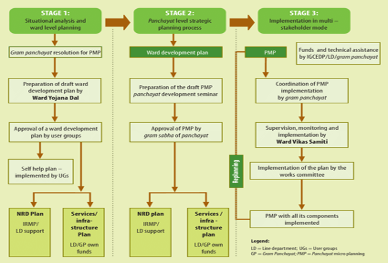Published on: November 8, 2022

Five-year ‘perspective plan’
Five-year ‘perspective plan’

Why in news?
Rural areas in Karnataka to get 5-year plans from next fiscal
Highlights
- From 2023-24, every gram panchayat will have its own perspective plan for which work has started.
- The plans, which will be in force till 2027-28, will be linked to various Sustainable Development Goals (SDG) targets.
- Under the Karnataka Gram Swaraj Act, the gram panchayats are expected to prepare a five-year perspective plan.
- The five-year plans will have targets for every gram panchayat to achieve, according to an orderissued by the RDPR department.
- The targets have to be revised based on a review of physical progress and statistics of the previous year’s achievements
How this plans pay a way for development?
- The government has identified eight sectors on which the perspective plans would focus: poverty, livelihood & skill development, health, education, women & child development, socially secure village, environment & natural resources, infrastructural self-dependent village; good governance village.
- Another focus areas is identifying unused land that is fit for agriculture.
What are advantages of having Perspective plan ?
- Awareness among the district , block and village level for addressing the imbalances
- Creation of a sense of ownership for the development of the block
- to create capacity in districts to monitor human development status at district and sub-districtlevels in order to achieve inclusive economic growth.
- Addressing backwardness and focused interventions and formulation of such interventions require in depth analysis of the causes
- Participatory Appraisal (PAs) involve all the social segments like farmers, women, labourers, NGOs, academia, and social entrepreneurs from all communities which makes it inclusive
- Skill development is one of the important community works which can be taken up.
- It will help to formulate schemes to impart awareness in matters of public interest like cleanliness, environmental protection / pollution control.
- Good governance by responsiveness implying that the needs especially of disadvantaged groups are responded to in decision-making.
- Similarly, items, such as land shaping, drainage, and field channels on private lands which are part of a project to improve the productivity of an area
- Create in depth understanding on poverty among panchayat commitees as well as strengthen the committee working on poverty alleviation by facilitating the SHG formation
What are the challenges in this regard?
- Absence of clear functional jurisdiction for the panchayats is the most important drawback of the 73rd Amendment Act.
- Much administrative support and operational autonomy will be given for the panchayats to execute its responsibilities is not clear at this moment
- It is evident that the bureaucracy has an upper hand and hence to what extent the democratic institutions will get a free hand is an issue of concern.
- Involvement of these leaders in the plan will definitely influence local leadership in their favour. This will specially happen in the states where panchayat elections are to take place on party basis
the way forward:
- To meet these challenges there is a need to evolve a multidisciplinary approach with diverse needs and interests will have to work together to make better decisions
- Development planning process were to decentralised down to the district level then this should go hand in hand with the Government of India reducing the centrally sponsored plan scheme and allowing State Governments to function freely in their allotted spheres
- There is a need to increase the panchayat area of discretion in planning with their own funds and in assuring that the sectoral schemes and other departmental programmes are coordinated and integrated by them
- In order to meet the demands of the job, it is essential that both the officials and the non-officials manning the machinery acquire proper knowledge attitudes and skills
- To ensure continuous qualitative and quantitative improvement, innovation is required in decentralised planning and implementation. Various departments at the state level should sponsor programme innovations and researchespecially through NGOs

